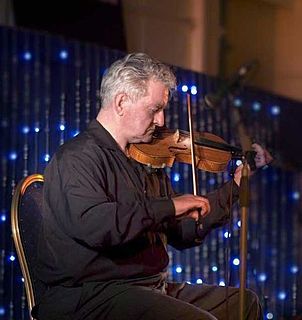
The Donegal fiddle tradition is the way of playing the fiddle that is traditional in County Donegal, Ireland. It is one of the distinct fiddle traditions within Irish traditional music.
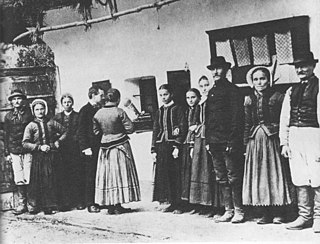
Folk music is a music genre that includes traditional folk music and the contemporary genre that evolved from the former during the 20th-century folk revival. Some types of folk music may be called world music. Traditional folk music has been defined in several ways: as music transmitted orally, music with unknown composers, music that is played on traditional instruments, music about cultural or national identity, music that changes between generations, music associated with a people's folklore, or music performed by custom over a long period of time. It has been contrasted with commercial and classical styles. The term originated in the 19th century, but folk music extends beyond that.

Bluegrass music is a genre of American roots music that developed in the 1940s in the Appalachian region of the United States. The genre derives its name from the band Bill Monroe and the Blue Grass Boys. Unlike mainstream country music, bluegrass is traditionally played on acoustic stringed instruments. Bluegrass has roots in traditional English, Scottish, and Irish ballads and dance tunes and in traditional African-American blues and jazz. Bluegrass was further developed by musicians who played with Monroe, including 5-string banjo player Earl Scruggs and guitarist Lester Flatt. Monroe characterized the genre as: "Scottish bagpipes and ole-time fiddlin'. It's a part of Methodist, Holiness and Baptist traditions. It's blues and jazz, and it has a high lonesome sound."

Scottish folk music is a genre of folk music that uses forms that are identified as part of the Scottish musical tradition. There is evidence that there was a flourishing culture of popular music in Scotland during the late Middle Ages, but the only song with a melody to survive from this period is the "Pleugh Song". After the Reformation, the secular popular tradition of music continued, despite attempts by the Kirk, particularly in the Lowlands, to suppress dancing and events like penny weddings. The first clear reference to the use of the Highland bagpipes mentions their use at the Battle of Pinkie Cleugh in 1547. The Highlands in the early seventeenth century saw the development of piping families including the MacCrimmons, MacArthurs, MacGregors and the Mackays of Gairloch. There is also evidence of adoption of the fiddle in the Highlands. Well-known musicians included the fiddler Pattie Birnie and the piper Habbie Simpson. This tradition continued into the nineteenth century, with major figures such as the fiddlers Niel and his son Nathaniel Gow. There is evidence of ballads from this period. Some may date back to the late Medieval era and deal with events and people that can be traced back as far as the thirteenth century. They remained an oral tradition until they were collected as folk songs in the eighteenth century.

Battlefield Band were a Scottish traditional music group. Founded in Glasgow in 1969, they have released over 30 albums and undergone many changes of lineup. As of 2010, none of the original founders remain in the band.
The Clutha were a traditional Scottish band hailing from Glasgow, that released a small number of albums in the 1970s. The line-up on the Clutha's first album, Scotia (1971), was John Eaglesham, Erlend Voy, Calum Allan (fiddle), Ronnie Alexander and Gordeanna McCulloch (vocals). The same band members are credited on their 1974 album, Scots Ballads Songs & Dance Tunes. By the time of their 1977 release, The Bonnie Mill Dams, Jimmy Anderson had joined the group on chamber pipes and bagpipes, and Eaglesham had left the group.
Máire Ní Chathasaigh is an Irish harpist, composer and singer.
Celtic rock is a genre of folk rock, as well as a form of Celtic fusion which incorporates Celtic music, instrumentation and themes into a rock music context. It has been extremely prolific since the early 1970s and can be seen as a key foundation of the development of highly successful mainstream Celtic bands and popular musical performers, as well as creating important derivatives through further fusions. It has played a major role in the maintenance and definition of regional and national identities and in fostering a pan-Celtic culture. It has also helped to communicate those cultures to external audiences.

The Celtic fiddle is one of the most important instruments in the traditional repertoire of Celtic music. The fiddle itself is identical to the violin, however it is played differently in widely varying regional styles. In the era of sound recording some regional styles have been transmitted more widely while others have become more uncommon.

John Doherty was an Irish folk fiddler.

Malinky is a Scottish folk band specialising in Scots song, formed in autumn 1998.
Peter Douglas Kennedy was an influential English folklorist and folk song collector throughout the 1950s, 1960s and 1970s.
Pete Morton is an English folk singer-songwriter who lives in London, England. According to fRoots, Morton "is amongst the best that the British roots music scene has produced in living memory."
Siân Phillips is a fiddle player specialising in Welsh Folk and Fiddle Music.
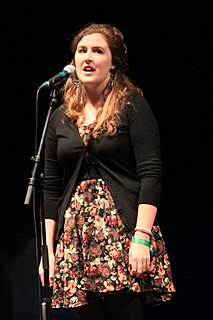
Ruth Keggin is a Manx Gaelic singer-songwriter. She holds degrees from the University of York and the University of Cambridge.
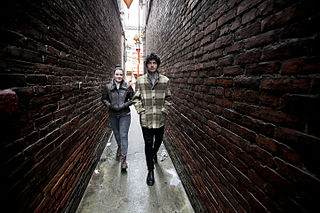
Quinn & Qristina Bachand are a brother-sister duo from Victoria, British Columbia, Canada. Qristina plays fiddle and sings; Quinn plays acoustic guitar, Irish tenor banjo, clawhammer banjo, bodhran, fiddle, electric guitar and sings. Since forming in 2007, they have become important names in the international Celtic music scene, performing across Canada, the US and in Europe at clubs, concert halls and music festivals. Qristina and Quinn have shared the stage with the likes of Ashley MacIsaac, Battlefield Band, Lau, Lunasa, Liz Carroll & John Doyle, Natalie MacMaster, and The Barra MacNeils.
Cathal McConnell is a musician and singer best known as the mainstay of traditional band The Boys of the Lough, of which he was a founder member. His main instruments are the Irish flute and the tin whistle.
Talisk are a Scottish folk band composed of Mohsen Amini, Benedict Morris, and Graeme Armstrong. The band rose to prominence after winning the 2015 BBC Radio 2 Young Folk Award and the MG Alba Scots Trad Music Awards "Folk Band of the Year" category in 2017.

Jenn Butterworth is an acoustic folk guitarist and singer based in Glasgow, Scotland, who was awarded the title "Musician of the Year" at the 2019 Scots Trad Music Awards, and was nominated for the same title at the 2019 BBC Radio 2 Folk Awards. She was a founder member of Kinnaris Quintet, who won the Belhaven Bursary for Innovation in Scottish Music at the 2019 Scots Trad Music Awards.
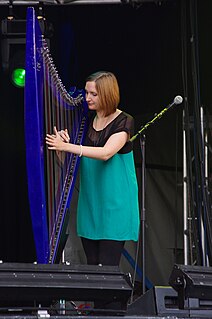
Rachel Newton is a Scottish singer and harpist. As well as playing both acoustic and electric harp she also plays viola, fiddle, piano and harmonium. She performs solo as well as in the bands The Shee, The Furrow Collective and Boreas and was formerly a member of the Emily Portman Trio. She was a member of the Lost Words Spell Songs project and is a co-founder of The Bit Collective, a group campaigning for equality in folk music.












